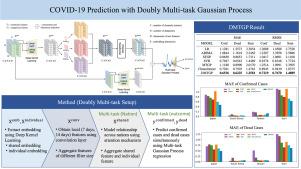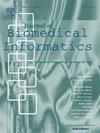基于双多任务高斯过程的COVID-19预测。
IF 4.5
2区 医学
Q2 COMPUTER SCIENCE, INTERDISCIPLINARY APPLICATIONS
引用次数: 0
摘要
本文提出了一种新的双多任务高斯过程(DMTGP)模型,解决了现实世界中具有时间序列特征的多任务预测问题。由于确诊病例数与死亡病例数之间以及不同国家病例数之间存在很强的相关性,该模型结合任务相关性来预测COVID-19患者数量,同时考虑特定任务(个人)和跨任务(共享)信息,以提高整体绩效。为了模拟这些国家之间的相互作用,我们使用了Transformer编码器层来计算交叉注意分数。对注意力得分图的定性分析表明,我们的框架有效地捕捉了多个国家之间随时间的动态关系。实验结果表明,DMTGP模型在处理多重任务方面优于其他基准模型。本文章由计算机程序翻译,如有差异,请以英文原文为准。

COVID-19 prediction with doubly multi-task Gaussian Process
This paper addresses a real-world multi-task prediction problem with time-series characteristics by proposing a novel Doubly Multi-Task Gaussian Process (DMTGP) model. Motivated by strong correlations between the number of confirmed cases and deaths, as well as between cases across the different countries, the model incorporates task-wise correlations to predict the number of COVID-19 patients, considering both task-specific (individual) and cross-task (shared) information to enhance overall performance. We constructed a database for three East Asian countries — Japan, South Korea, and Taiwan — and aim to simultaneously predict the number of confirmed cases and deaths in each country. To model the interactions among these countries, we employed a Transformer encoder layer to calculate cross-attention scores. Qualitative analysis of the attention score map demonstrates that our framework effectively captures the dynamic relationships between multiple nations over time. Our experimental results show that the DMTGP model outperforms other baseline models in handling doubly multiple tasks.
求助全文
通过发布文献求助,成功后即可免费获取论文全文。
去求助
来源期刊

Journal of Biomedical Informatics
医学-计算机:跨学科应用
CiteScore
8.90
自引率
6.70%
发文量
243
审稿时长
32 days
期刊介绍:
The Journal of Biomedical Informatics reflects a commitment to high-quality original research papers, reviews, and commentaries in the area of biomedical informatics methodology. Although we publish articles motivated by applications in the biomedical sciences (for example, clinical medicine, health care, population health, and translational bioinformatics), the journal emphasizes reports of new methodologies and techniques that have general applicability and that form the basis for the evolving science of biomedical informatics. Articles on medical devices; evaluations of implemented systems (including clinical trials of information technologies); or papers that provide insight into a biological process, a specific disease, or treatment options would generally be more suitable for publication in other venues. Papers on applications of signal processing and image analysis are often more suitable for biomedical engineering journals or other informatics journals, although we do publish papers that emphasize the information management and knowledge representation/modeling issues that arise in the storage and use of biological signals and images. System descriptions are welcome if they illustrate and substantiate the underlying methodology that is the principal focus of the report and an effort is made to address the generalizability and/or range of application of that methodology. Note also that, given the international nature of JBI, papers that deal with specific languages other than English, or with country-specific health systems or approaches, are acceptable for JBI only if they offer generalizable lessons that are relevant to the broad JBI readership, regardless of their country, language, culture, or health system.
 求助内容:
求助内容: 应助结果提醒方式:
应助结果提醒方式:


